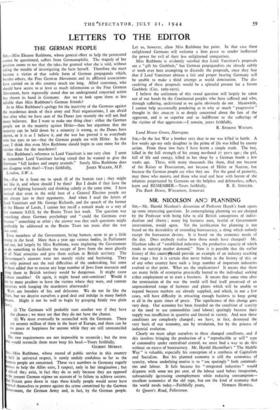MR. NICOLSON AND PLANNING
SIR,—Mr. Harold Nicolson's discussion of Professor Hayek's book opens up some interesting questions. In contemplating planning we are charged by the Professor with being false to old British conceptions of indivi- dualism and liberty ; many big business men, fearful of Government intervention, would agree. Yet the justification for planning is not based on the desirability of extending bureaucracy, a thing which nobody except the bureaucrat desires. It is based on the economic needs of the day. Does anybody realise how those needs have changed? Mr. Nicolson talks of " established industries, the productive capacity of which tends to outstrip market demand." Now it is possible that the earlier history of this countr3Ilitould provide an example of an industry reaching that stage ; but it is certain that never before in the history of this or of any other country have such a large number of important industries evolved to that point. What are the implications? It means that there are many fields of enterprise practically barred to the individual seeking either employment or to start a business. It means that some time after the termination of the war the world will find itself possessed of an unprecedented range of factories and plants which will be unable to expand because markets are already supplied, and which, in not a few cases, will have difficulty in attracting enough business to keep going at all in the quiet times of peace. The significance of this change goes very deep. Our economy has been founded on the condition of scarcity or the need to use commodities (and labour) sparingly because their supply was insufficient in quantity and limited in variety. And now those conditions are completely changed ; we hay; in fact, destroyed the very basis of our economy, not by revolution, but by the process of industrial evolution.
Clearly we must adapt ourselves to these changed conditions, and if this involves bringing the production of a "reproducible at will" type of commodity under centralised control, we mast find a way to do this without an excess of bureaucracy. Mr. Harold Macmillan's " The Middle Way " is valuable, especially his conception of a synthesis of Capitalism and Socialism. But his planned economy is still the economics of scarcity, whose underlying motive is to " use sparingly " both commodi- ties and labour. It fails because his " integrated industries " would dispense with some ten per cent. of the labour used before 'integration, substantially increasing unemployment while reducing consumption— excellent economics of the old type, but not the kind of economy that
the world needs today.—Faithfully yours, NORMAN HOWELL.
6i Queen's Road, Felixstowe.






















 Previous page
Previous page